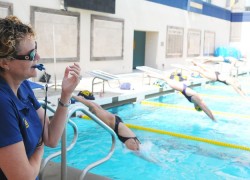
It was 2000 and Natalie Coughlin was burned out as a high school senior.
After years of training in an exhausting, distance-intensive swim program, she was physically fatigued.
A shoulder injury suffered during the previous year set Coughlin back in her training and her overbearing coach was draining her emotionally.
The future NCAA champion and U.S. Olympian even thought about quitting.
Looking to compete in-state during college, the Bay Area native needed someone with a different coaching mentality. Someone who would help nurture her back into loving the sport again.
Cal swim coach Teri McKeever was just that person.
Growing up as the oldest of ten children, McKeever was responsible for helping care for her younger siblings. This helped her develop the caring and encouraging attitude that so many of her future athletes needed.
“She is maternal,” Coughlin says of her coach. “She is a caregiver and it comes through in her (coaching) style.”
The coaching that McKeever has imparted on to her team for 18 years at Spieker Aquatics Complex is grounded in unconventional thinking.
“I am a coach that likes to coach and teach through concepts,” McKeever says. “An elite level athlete can learn something in a different way and apply it with a much deeper, complex understanding of the concept.”
She focuses on the technicalities of the body’s movement through the water, teaching them to her team through dance practice, yoga, cycling and other out-of-pool exercises.
Her different approach challenges the traditional coaching paradigms that focus on drilling repetition.
However unique the coach’s philosophies were, they appealed to Coughlin, along with McKeever’s relaxed attitude. Long past Coughlin’s collegiate career, they are still together as coach and student, with McKeever helping prepare Coughlin for her third Olympic Games in 2012.
“Our personalities have meshed,” Coughlin says. “It is not always a relationship that works. The way she coaches works for me and I want to finish my career with her.”
That decorated career has brought 11 Olympic medals, including a six medal performance in Beijing in 2008 – a record for a female.
McKeever was by her side in both 2004 and 2008, making history as the first female coach on the U.S. swimming team.
Coughlin is not the only swimmer whom the Bears’ coach has turned around.
Dana Volmer, a former Olympian and NCAA Swimmer of the Year for Cal, suffered a back injury while competing for a typical yardage-based program at Florida. She needed the same healing Coughlin did and found it in McKeever as well.
“Not only is (McKeever) taking less heralded kids and getting them to overachieve, but she is taking fallen stars who were left for dead and coaching them to newer heights in a sport where that doesn’t happen,” says Michael Silver, a Cal alum and current Yahoo! sportswriter who co-wrote Coughlin’s autobiography, Golden Girl.
Indeed, superstars like Coughlin and Volmer are not the only potential Bears that the coach attracts.
McKeever says that she looks for someone who is “coachable, with self-awareness, who is honest with themselves, held to a high standard and works well with others.”
The style of coaching that McKeever puts forth and the successful program she has built allow for her to look for recruits who will complement her uniqueness and build her team.
Part of her individuality comes with going against expectations.
After her fourteenth season with the Bears in 2006, McKeever was offered the head coaching position at USC. It was an opportunity that many would have thought irresistible to her.
Her father had been an All-American guard for the Trojans’ football team and McKeever eventually followed her father’s footsteps to earn her own All-American honors in a USC swim cap.
It was there that she found her way into the world of collegiate coaching as an assistant.
Yet, she remained in Berkeley.
“The main reason (for staying) was that I was proud of what I had built here,” McKeever says. “I was proud of the team culture, the environment, the type of women we were attracting. We were on the verge of some great things.”
Her intuition served her well.
Few people could have forecasted that the ninth-ranked swim team in the nation would take home its first ever NCAA championship in 2008.
McKeever credited every team member’s hard work for the win. The team aspect of swimming is something she always recognizes and teaches.
“I want someone who is willing to be a part of a team,” McKeever says. “It’s a belief in something bigger than themselves.”
Her team-oriented approach shines in a sport dominated with indidvidual accolades, and it is yet another element of a unique coaching style filled with experimentation.
“The more you understand yourself and like who you see in the mirror and being proud of that person,” McKeever says, “that is what I do every day out by the pool.”
